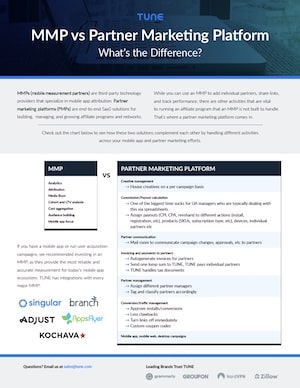
Today’s consumers spend more time on their phones than on any other device, and that includes when they shop, browse, and engage with brands.
If your affiliate program isn’t optimized for mobile, you’re leaving money and opportunities on the table.
In this post, we’ll explain why mobile matters in affiliate marketing, how tracking has evolved to keep up, and what you can do to make your mobile campaigns shine.
Why Mobile Matters More Than Ever
Mobile now makes up more than half of global web traffic, and users spend nearly four hours a day on mobile apps. That means your customers and your partners are already mobile-first.
If your affiliate program is still designed for desktop, you’re missing the biggest share of your audience. Whether it’s driving app installs, in-app purchases, or clicks through mobile web, mobile touchpoints are defining the future of affiliate marketing.
Apps, Web, and Why You Need Both
A strong mobile affiliate marketing strategy includes both apps and mobile web, as each has unique advantages for partner campaigns.
Mobile Apps
Apps create deeper engagement and higher retention than websites. They let affiliates guide users straight to specific products or offers with deep links, creating a seamless path to purchase. Industries like gaming, e-commerce, and fintech have seen huge growth thanks to app-focused campaigns, and affiliates appreciate the stronger conversion rates that apps deliver.
Mobile Web
Mobile web is just as important. It’s flexible, easy to access, and accounts for around 60% of affiliate-driven traffic. That’s why you should:
- Build fast, responsive pages
- Keep navigation simple
- Optimize load times
Together, apps and web create richer customer journeys that desktop-only strategies can’t match.
Tracking Mobile Performance: What’s Changed?
Mobile isn’t just a different screen. Because of the nature of mobile operating systems, this channel requires different tracking methodologies.
Cookies don’t work reliably in mobile environments, which is why modern affiliate programs rely on cookieless postback tracking and mobile measurement partners (MMPs).
Mobile Measurement Partners
Mobile measurement partners, or MMPs, integrate directly with your app, ad networks, and affiliates to deliver accurate attribution. You’ll know exactly which affiliate drove each install, click, or purchase, and you can reward them with confidence.
Server Postbacks
Server-side postback tracking bypasses browsers completely. It ensures you get accurate, real-time data, even when cookies fail.
With MMPs and postback tracking, you can have confidence in your performance data and help future-proof your mobile affiliate marketing program as privacy rules evolve.
How TUNE Helps Marketers Win on Mobile
TUNE was built with mobile in mind, and we continue to innovate within the space. We also have native integrations with the top five mobile measurement partners.
Here’s how our platform helps advertisers and agencies simplify mobile affiliate marketing:
- Seamless integrations with MMPs, apps, ad platforms, and affiliate networks
- Native postback tracking and cookieless tracking that’s easy to implement
- Real-time dashboards to show what’s working and what needs improvement
In other words: The TUNE Partner Marketing Platform makes it easier to measure, optimize, and grow your mobile campaigns.
The Future of Affiliate Marketing Is Mobile
Mobile isn’t just an option anymore — it’s a foundational part of modern affiliate marketing. Brands that embrace mobile-first strategies see better engagement, stronger partnerships, and higher ROI. With TUNE’s tools and expertise, you can connect with customers wherever they are and give your affiliates the transparency and trust they need to succeed.
Want to learn more about how mobile measurement partners can help to power your program? Check out our MMP vs Partner Marketing Platform Cheat Sheet, or download our Ultimate Guide to Mobile Partner Marketing.
Still have questions? Reach out to us at [email protected] with your questions.
Author
Becky is the Senior Content Marketing Manager at TUNE. Before TUNE, she handled content strategy and marketing communications at several tech startups in the Bay Area. Becky received her bachelor's degree in English from Wake Forest University. After a decade in San Francisco and Seattle, she has returned home to Charleston, SC, where you can find her strolling through Hampton Park with her pup and enjoying the simple things in life.





Leave a Reply
You must be logged in to post a comment.